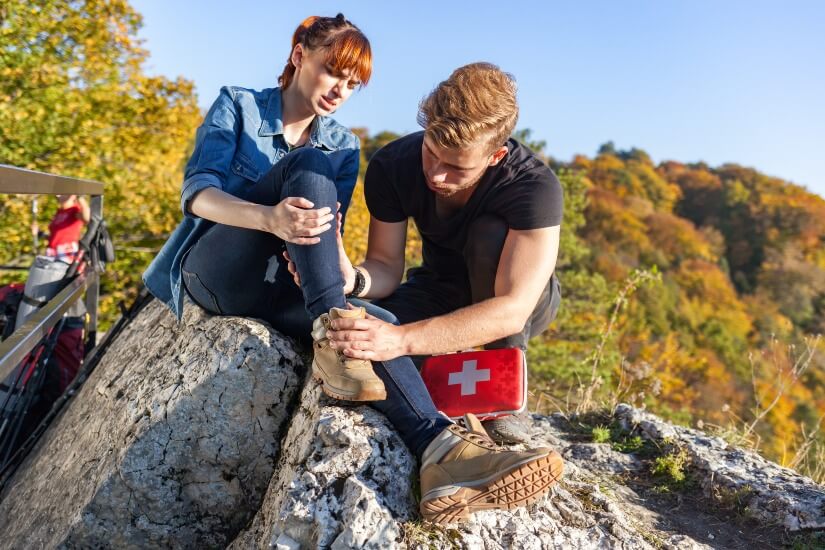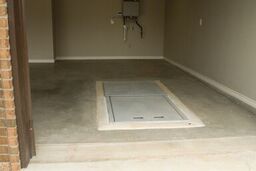Tornado Warning Signs You Need to Know
Assembling A Disaster Supply Kit
Before a severe storm hits, we suggest assembling a disaster supply kit that contains the following:
- First Aid Kit
- Canned Food & Can Opener
- Battery-Powered Radio & Flashlights (remember extra batteries)
- At Least 3 Gallons of Water
- Protective Clothing
- Sleeping Bags or Blankets & Pillows
- Special Items For Infants, Elderly or Disabled Family Members
- Written Instructions on How to Turn Off Electricity, Gas & Water
- Glow Sticks
What are you waiting for? Start protecting your family by assembling your disaster supply kit today! If you have any questions, feel free to contact us.
Aiding the Injured After a Tornado
Tornado Injury Preparedness with Ground Zero Shelters
Living in places like Oklahoma City, OK, or nearby Tulsa, OK, you've probably seen how strong tornadoes can be. When tornadoes hit, our first thought is often about the safety of our friends, family, and neighbors. People might get hurt in different ways - from small cuts to very serious injuries. Being prepared and knowing what to do can really help people in tough times.
Knowing How Tornadoes Can Hurt People
Tornadoes are powerful storms that do more than just damage homes and trees. They can also hurt people in many ways. Some folks might get cut by flying things, while others could get hurt if a building falls down. After a tornado, things can be really messy and scary. By knowing what kinds of injuries can happen during a tornado, you'll be better prepared to help out with first aid if needed.
What to Do Right After a Tornado
Tornadoes can strike quickly and leave a trail of devastation in their wake. In the immediate aftermath of such a powerful storm, it's essential to know the right steps to ensure not just your safety, but also to assist those around you. Here's some simple tips on how to respond effectively right after a tornado strikes.
- Stay Safe First: Before you try to help others, take a quick look around to make sure it's safe. It's important to remember that you can't help anyone if you get hurt too.
- Look for People Who Need Help: Go to the people around you and ask if they're okay. Sometimes, people might be hurt on the inside even if they look fine on the outside.
- Help the Best You Can: If someone has a small injury, you can use a tornado first aid kit to help them. But if they have a big injury, like a deep cut or something looks broken, or if they've passed out, you need to call for an expert like a doctor or paramedic. Having a good tornado first aid kit on hand can be a big help during times like this.
Key First Aid Tips for Natural Disaster Injuries
In the aftermath of a natural disaster, knowing how to respond to injuries can be life-saving. As chaos ensues, a few key first-aid measures can make a significant difference. Whether you're dealing with severe trauma or a person struggling to breathe, being prepared is essential. Here are a few tips on dealing with injuries from a natural disaster:
- Serious Injuries: If you encounter someone with severe injuries, avoid moving them unless they are in direct danger. For unconscious individuals, stabilize their neck and back before moving them. Always call for professional help immediately.
- Resuscitation: If someone isn't breathing, clear their airway and begin mouth-to-mouth resuscitation. Remember to ensure the person is lying on a flat surface and turn their head to the side if they're at risk of vomiting.
- Avoid Giving Liquids: Never attempt to feed or give liquids to an unconscious person. This can lead to choking or other complications.
Being Prepared with a Tornado First Aid Kit
In the face of such unpredictable events like tornadoes, preparation is key. A tornado first aid kit should be comprehensive and tailored to address the most common natural disaster injuries. Some essentials to include are bandages, antiseptics, pain relievers, scissors, sterile gauze, and a CPR face shield. Additionally, given the frequency of tornadoes in areas like Oklahoma City and Tulsa, it might be beneficial to undergo basic first aid training.
Turning to Trusted Solutions for Safety
While offering first aid after natural disasters is critical, preventive measures can't be understated. Ground Zero Shelters is steadfast in its commitment to equip communities in Oklahoma City, OK, Tulsa, OK, and beyond with top-tier storm shelters. With the right preparations and tools, we can mitigate risks and better protect our loved ones.
Healing Communities Post-Tornado With Ground Zero Shelter
After a tornado, helping hurt people is about more than just giving first aid. It's about showing them that someone cares and is there for them when they're scared. When we learn the right ways to help and have the tools we need, we can truly help our community heal after these tough times. If you want to be ready to protect your family and neighbors, or if you have any questions about how storm shelters work, reach out to Ground Zero Shelters. By working together, we can make sure we're prepared for whatever Mother Nature sends our way. Contact us today!
Your Well-Being
If you are aiding in helping victims or clean-up, take your health seriously. Take a look at our recommended tips below:
- Be aware of exhaustion. Don’t try to do too much at once: set priorities, pace yourself & get enough rest.
- Drink plenty of clean water & eat well.
- Wear sturdy work boots & gloves.
- Wash your hands thoroughly with soap and clean water often when working in debris.
Have more questions? No worries! Contact us for more information – we would love hearing from you!
Safety Issues
It is of the utmost importance that you are aware of how to handle safety issues after a disaster. First thing, make sure you are aware of the new safety issues created by the disaster. Watch for:
- Washed Out Roads
- Gas Leaks
- Contaminated Buildings
- Broken Glass
- Contaminated Water
- Slippery Floors
- Damaged Electrical Wiring
Inform local authorities about the health and safety issues you are dealing with, including the following:
- Downed Power Lines
- Dead Animals
- Chemical Spills
- Smoldering Insulation
- Washed Out Roads
Contact Ground Zero Storm Shelters if you have any more questions! We are here to help!
After a Tornado, Watch For These Hazards When Entering Your Home

Tornadoes are wild storms that can pop up without much warning and cause a lot of damage. If you live in places like Oklahoma City or Tulsa, you've probably heard about or seen their effects. Imagine strong winds tearing through towns, knocking over trees, and even damaging houses. After a tornado, many dangers might still be hiding inside homes. It's super important for people living in these areas to know what to look out for once the storm has passed. Let's talk about the safety steps you should take when checking your home after a tornado has hit.
Checking Your Home After a Tornado: Safety First!
After a tornado has passed, it might be tempting to quickly go inside your home to see the damage. But hold on a minute! Safety should always come first. Before you even think about going inside, walk slowly around the outside of your home. This will let you spot any dangers like hanging power lines, the smell of gas, or parts of your home that look like they might fall down. If you're not sure if it's safe to go in, always get a professional like a building inspector to check it out first. Remember to bring a battery-powered flashlight with you. But here's a tip: turn it on before you step inside. Why? Well, if there's a gas leak inside your home, even the tiny spark from turning on a flashlight can cause big problems. And while we all love our phones, try to save them for really important calls after a tornado. This keeps the phone lines open for big emergencies. Safety should always be your number one priority!
Look Out for These Dangers After a Tornado
Tornadoes can cause a lot of damage, and sometimes it's not always easy to see the dangers right away. Here are some big warning signs you should always look out for:
- Smelling Gas: This is a big red flag! If you smell gas around your home, it could mean there's a leak. Gas leaks can cause explosions if they're not taken care of right away. It's super important to leave the area and get help.
- Water Around Your Home: After a tornado, there might be water everywhere. But be careful! This water can be dangerous in two ways. First, it might be carrying electricity from power lines that fell down. That means stepping in the water can be really dangerous. Also, the water can hide sharp things like broken glass. It's best to wait until the water goes away and professionals say it's safe before you go back inside.
- Burned Areas: If parts of your home burned during the tornado, be extra careful. Buildings that have been on fire can be weaker and might not be safe to go into. It's a good idea to have a professional check it out first.
And always remember to watch where you're going. After a tornado, there might be things on the ground or hanging from buildings that can hurt you. Stay safe and always be on the lookout!
Wild Animals After a Tornado: What You Should Know
Oklahoma is home to a lot of different animals. But after a tornado, some of these animals might be scared and confused. They could end up in places they don't usually go, like your backyard or even inside your house!
- Watch Out for Snakes and Other Critters: One thing to be careful of is snakes. Some snakes in Oklahoma can be poisonous. After a tornado, they might be hiding in piles of broken things or debris. It's a good idea to use a stick to move stuff around if you're cleaning up. That way, you can see if there's a snake or any other animal without getting too close.
- Ground Zero Shelters Cares: At Ground Zero Shelters, we know how important it is to be safe after a tornado. And that includes being safe around animals that might be scared or hurt. Remember to give them space and be careful. It's always best to respect and understand our local animals, especially when they're going through tough times like after a tornado.
Stay Safe with Ground Zero
Living in places like Oklahoma City and Tulsa means that tornadoes are something we have to think about. But just because tornadoes are a part of our life, it doesn't mean we can't be ready for them. Ground Zero Shelters is here not only to offer great tornado shelters but also to help our community be prepared and informed about tornadoes and what to do afterward. Contact us today to find out more.
What to Look for When Entering Your Home After a Natural Disaster
When you go inside your home after a natural disaster, there are certain things you should and should not do. Enter the home carefully and check for damage. Be aware of loose boards and slippery floors. The following items are other things to check inside your home:
- Natural Gas - If you smell gas or hear a hissing or blowing sound, open a window and leave immediately. Turn off the main gas valve from the outside, if you can. Call the gas company from a neighbor’s residence. If you shut off the gas supply at the main valve, you will need a professional to turn it back on. Do not smoke or use oil, gas lanterns, candles or torches for lighting inside a damaged home until you are sure there is no leaking gas or other flammable materials present.
- Roof, Foundation & Chimney Cracks - If it looks like the building may collapse, leave immediately.
- Clean Up Household Chemical Spills - Disinfect items that may have been contaminated by raw sewage, bacteria, or chemicals. Also clean salvageable items.
- Appliances - If appliances are wet, turn off the electricity at the main fuse box or circuit breaker. Then, unplug appliances and let them dry out. Have appliances checked by a professional before using them again. Also, have the electrical system checked by an electrician before turning the power back on.
- Basement - If your basement has flooded, pump it out gradually (about one third of the water per day) to avoid damage. The walls may collapse and the floor may buckle if the basement is pumped out while the surrounding ground is still waterlogged.
- Water & Sewage Systems - If pipes are damaged, turn off the main water valve. Check with local authorities before using any water; the water could be contaminated. Pump out wells and have the water tested by authorities before drinking. Do not flush toilets until you know that sewage lines are intact.
- Food & Other Supplies - Throw out all food and other supplies that you suspect may have become contaminated or come in to contact with floodwater.
- Sparks, Broken or Frayed Wires - Check the electrical system unless you are wet, standing in water or unsure of your safety. If possible, turn off the electricity at the main fuse box or circuit breaker. If the situation is unsafe, leave the building and call for help. Do not turn on the lights until you are sure they’re safe to use. You may want to have an electrician inspect your wiring.
- Open Cabinets - Be alert for objects that may fall.
- Call Your Insurance Agent - Take pictures of damages. Keep good records of repair and cleaning costs.
What are you waiting for? Start protecting your family by ordering your shelter today!
|
< Previous
<< First |
Go to > 4 5 6 7 8 9 10 11 |
Next >
Last >> |








